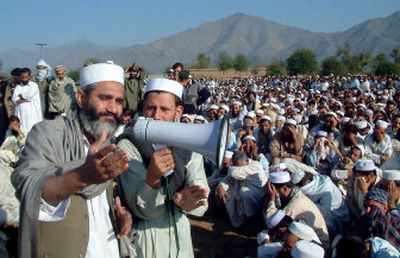Attack on Islamic school sought al-Qaida targets

WASHINGTON – A missile strike that killed close to 80 people at an Islamic school in Pakistan early Monday was launched because of U.S. intelligence reports that senior al-Qaida figures were hiding there, Pakistani intelligence officials said. The strike generated angry protests by religious and tribal leaders, who accused the government of doing Washington’s bidding at the cost of Pakistani lives.
The country’s major Islamic party charged that U.S. military planes carried out the attack, which demolished the school, located near the border with Afghanistan. Pakistani and U.S. military officials denied that, saying the raid was the work of Pakistani helicopter gunships and forces, though U.S. intelligence had prompted it.
“This was a training camp, and they had been warned to stop their activities,” said Gen. Mahmud Ali Durrani, Pakistan’s ambassador in Washington. “They did not pay heed, so they were hit by our gunships and all the people there were killed. There will be a lot of unhappy or misguided people saying we are killing our own people for the sake of the Americans, but we had a commitment to fight terrorism on our soil, and we made a decision.”
According to the Associated Press, about 10,000 tribesmen, including armed militants, rallied today in the northwestern town of Khar near the site, chanting: “God is Great,” “Death to Bush! Death to Musharraf!” and “Anyone who is a friend of America is traitor.”
Osama bin Laden and his deputy, Ayman al-Zawahiri, are believed to be hiding in the rugged Afghan-Pakistani border region, home to fiercely independent tribal peoples. Afghan officials also contend that Pakistan’s side of the border is serving as a sanctuary for newly aggressive Taliban insurgents in Afghanistan.
The attack in the Bajaur tribal district near the village of Khar caused the highest number of deaths of any single anti-extremist attack in Pakistan since 2001, when Pakistan’s president, Gen. Pervez Musharraf, agreed to side with the United States to help overthrow the Taliban in Afghanistan.
The raid on the Islamic studies school, known as a madrassa, seemed to represent an abrupt shift from the Musharraf government’s recent policy of seeking peaceful negotiations with extremists in the border regions. In the past several months, two peace deals were signed in the tribal areas of North and South Waziristan after sustained attacks there by the Pakistani military drew strong local opposition and caused heavy casualties on both sides.
A third such agreement was due to be signed this week, but it seemed almost certain to collapse now. Monday’s events are bound to compound problems for Musharraf, whose domestic political support has been steadily eroding.
Among those killed Monday was Maulana Liaquat, an Islamic cleric allied with al-Qaida who is believed to have hosted a dinner for al-Zawahiri in January that led to the missile strike in Damadola.